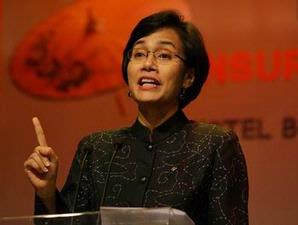
Vested interests are launching a covert attempt to replace Finance Minister Sri Mulyani Indrawati following her stern moves to guard the state budget from abuse and clamp down on violators, sources say.Efforts to topple the "iron lady" intensified after she turned down requests from a major conglomerate for government assistance in saving its business empire in the wake of the global financial meltdown, sources said."Speculation has been rife for the past two or three weeks. I think the political motive is bigger than those of the economy, with the market showing confidence in the minister," said Andi Rahmat, a member of the House of Representatives' Commission XI, which oversees financial affairs, on Tuesday.Andi said a possible replacement for Mulyani, proposed by the vested interest, was Darmin Nasution, the Finance Ministry's director general of taxation."It's going to be a very risky move by President Susilo Bambang Yudhoyono to replace Mulyani at a time when a figure like her is badly needed to shield Indonesia from the impact of the global downturn," he said.
Finance Ministry sources and some businessmen said one of the moves being made to discredit Mulyani was to promote an image of her as lacking nationalism, a sentiment widely touted since her appointment as minister back in 2004.Mulyani's previous post as an executive at the International Monetary Fund (IMF) has been used by her opponents to question her nationalism following criticism over the agency's poor performance in helping the country survive the late-1997 Asian financial crisis.Economist Faisal Basri, Mulyani's close friend and former colleague at the University of Indonesia, blamed certain parties, inconvenienced by Mulyani's moves to deal with the financial meltdown, as the main sponsors of the efforts."There are some politicians who suffered losses from the havoc in the stock market. Besides, knowing Mulyani well, it is not her 'style' to take a policy of suddenly closing down the stock market," he said.Faisal added it was unlikely Mulyani would be replaced by Darmin -- a close confidant of hers and a mentor during her time at the University of Indonesia.Ministry sources say businessmen involved in violations in the mining sector, the customs and excise business, and the tax sector were among those teaming up with businessmen who recently got burned in the stock market and could not recover their losses.
Mulyani has been praised for her efforts in reforming the once corruption-infested customs and tax offices, including refusing to allow 10 helicopters belonging to a firm linked to Vice President Jusuf Kalla to pass through customs before paying duties.Her courage was on show again when she ordered state-run Bank Mandiri to transfer disputed funds worth Rp 1.23 trillion (US$ 126 million) from Hutomo "Tommy" Mandala Putra, son of the late former president Soeharto, to the state account for development use.However, her latest move in refusing to help a politically wired business group has ignited a backlash of rage which may cost her her job unless Yudhoyono ensures Mulyani remains in her post until his administration ends.Finance Ministry spokesman Samsuar Said said the "cost will be too expensive for the Cabinet" if Mulyani leaves before the current administration ends its term next year."Use common sense. What is the motive in this kind of situation for unseating her?" he said.
Economist Pande Raja Silalahi said some businessmen were likely offended by Mulyani's statement during a recent speech at the office of the powerful lobby group the Indonesian Chamber of Commerce and Industry (Kadin)."I am the Finance Minister, my job is to protect the state fund. Companies have a job to protect their own financial affairs. If they fail, it is their fault and they deserve to go bust," said Pande, quoting Mulyani.
Comments